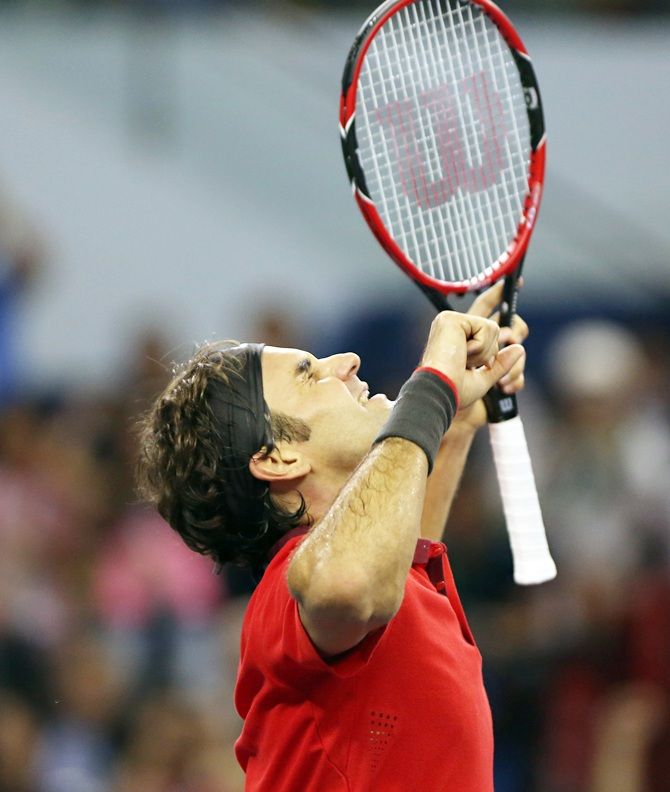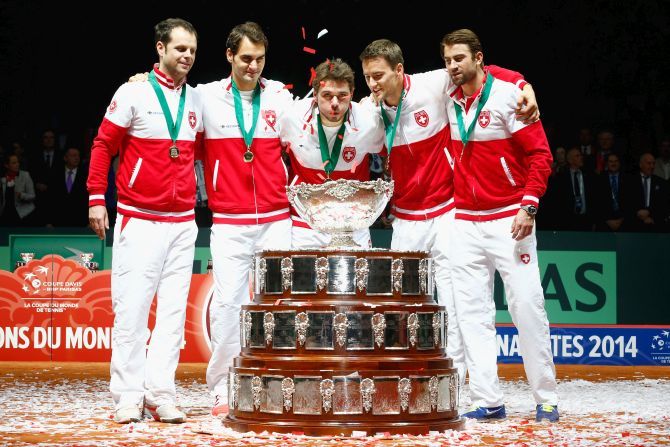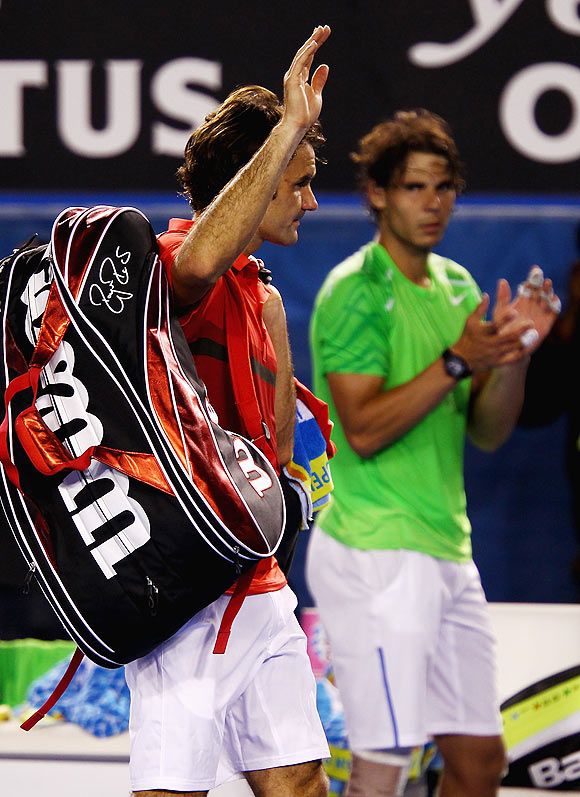In the twilight of his career, Roger Federer had a stellar season in 2014. He won 73 of his 85 matches, five titles from 11 finals, led Switzerland to the Davis Cup triumph and ended the year as the oldest year-end No. 2 in the history of the rankings.
His straight sets victory over Richard Gasquet in the Davis Cup final against France on Sunday not only made Switzerland only the 14th nation to win tennis's prestigious team title, but also completed the final piece in the Swiss's puzzle, says Bikash Mohapatra.

On Sunday, Roger Federer made a statement, both on and off the court.
His straight sets win over Richard Gasquet, in front of a crowd of 27,448 in Lille - a world record for a competitive tennis match – not only made Switzerland only the 14th nation to win the prestigious Davis Cup but also completed the final piece in the Federer puzzle.
It gave his resume a perfect score.
Though Switzerland had reached the final of the premier team competition back in 1992, Federer, during his illustrious career, could only help his country reach the semi-finals in 2003 (losing to Australia).

This triumph was as much Federer’s as it was Switzerland’s.
Most importantly, it put an end to the GOAT debate (acronym for greatest of all time).
“This is for them. I’ve won enough in my career that I don’t need this to complete my… everything, ticking off the box,” Federer was quoted as saying soon after the result.
The GOAT debate is something that has always elicited diverse opinion. The criteria has usually been either winning everything the sport has to offer or the number of Grand Slams.
On the one hand there have been players with stellar careers, who aren’t considered because they could not win it all.
Names like Jimmy Connors, Arthur Ashe, Pete Sampras, Boris Becker and Stefan Edberg – all missed out at the French Open – or Ivan Lendl, Guillermo Vilas and Mats Wilander (missed out at Wimbledon). These are players who won multiple majors, and manifold titles, but failed to complete their collection.
Then there are others like Bjorn Borg and John McEnroe who won a combined 18 majors and 140 titles between them but also missed out on a couple.
So, finally, it came down to those who won everything in the Open era – after 1968, when tennis became a full-fledged professional sport. That list had just four names: Rod Laver, Andre Agassi, Federer and Rafael Nadal.
Of them, Laver won 11 majors and twice did the career Grand Slam. However, six of those titles – including the first Grand Slam – happened before the sport turned professional.
Agassi won all the four majors, the ATP Finals in 1990, 17 Masters Series titles, the Olympic gold medal in Atlanta (1996), reached the No. 1 spot and also helped the United States to the Davis Cup title. But it is also a fact that he wasn’t always consistent in his nearly two-decade long career.
So the choice was basically between Federer and Nadal.
In an interview with Singapore newspaper Straits Times this May, Agassi said Nadal’s achievements are more impressive because he has had to deal with tougher opponents.
“I’d put Nadal No 1, Federer No 2. It’s just remarkable to me what he (Nadal) has done, and he has done it all during Federer’s prime,” the American was quoted as saying.
However, a couple of months later, soon after Federer lost an epic five-set final at Wimbledon to Novak Djokovic, Becker -- now the Serb’s coach -- observed the Swiss player’s effort was enough proof that he’s the greatest player of all time.
“(Roger) Federer has already won Wimbledon seven times and has been world No. 1 for a very long time. He didn’t really need another title, he is the greatest of all-time,” the German was quoted as saying.
For years the Swiss had staked his claim for the status.
Federer has thus far won 17 majors, 23 ATP Masters Series titles, almost 1,000 singles matches, spent over 300 weeks as the No. 1-ranked player, won six year-end championships, 82 titles and reached the semi-finals of 23 straight major tournaments and the quarter-finals 36 successive times.
Besides, he won the men’s doubles gold at the 2008 Beijing Olympics (partnering Stanislas Wawrinka) and the singles silver four years later in London. If this isn’t consistency what is.
The only thing missing from his resume was the Davis Cup. And now he has that as well.
Nadal, on the other hand has 14 major titles, 27 Masters Series trophies, more than 700 singles match wins, an Olympic singles gold medal (Beijing), 64 titles, has led Spain to David Cup success and has been ranked No. 1 for a total of 141 weeks.
However, there’s a missing element in the Spaniard’s otherwise impressive resume. In his decade-long career, Nadal is yet to win the world title (ATP Tour Finals).

So, that ends the argument in the Swiss’s favour.
Those who believe otherwise, point out at Federer’s unimpressive head-to-head record against Nadal. The two have played 33 times since 2004, and Nadal has won 23 of those matches.
But also true is the fact that 15 of those matches were on clay, Nadal’s best surface, and the Spaniard won 13 of those.
It is a fact that Nadal has been invincible on clay over the last decade. It’s also a fact that Federer was the second best player on the surface during the time.
The Swiss reached the final at Roland Garros on five occasions, winning it in 2009, has won 10 clay-court tournaments during the period and come up short against Nadal in 11 other finals -- including four at the French Open.
The same statistic doesn’t hold true in the case of Nadal when it comes to the other surfaces. While the Swiss has clearly been the dominant player on grass (14 titles in 19 finals) and hard courts (56 titles from 74 finals), the Spaniard hasn’t been the second best in either of them.
For the sake of argument, Novak Djokovic is behind Federer on hard courts, with 37 titles from 49 finals, while Andy Murray it is on grass (five titles from six finals).
Nadal has 16 titles on the hard court and three on grass. And even the most staunchest of his admirers will admit that the Spaniard, with his laborious back court game, struggles on faster courts. In other words, the slowing down of the other surfaces has helped Nadal considerably, a fact that cannot be denied.
That again, ends the argument is the Swiss’s favour.
In the twilight of his career, Federer, 33, had a stellar season in 2014. He won 73 of his 85 matches, five titles from 11 finals, led Switzerland to the Davis Cup triumph and ended the year as the oldest year-end No. 2 in the history of the rankings.
These stats, further justify his GOAT status, more so because Nadal, 28, more often than not struggles to play a full season.
However, the biggest recognition has come from the person who's contesting for the accolade.
Nadal was quoted as saying that he does not belong in the discussion for being the greatest player ever.
“I believe it is 100 percent fair that people say (Federer is the best ever) because he is today, and will be very difficult to any player to improve his numbers.”
The above admission ends the debate for sure. At least, for the time being.











